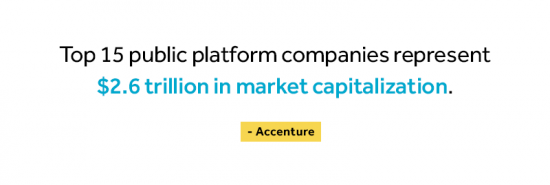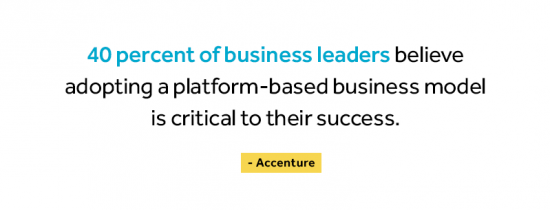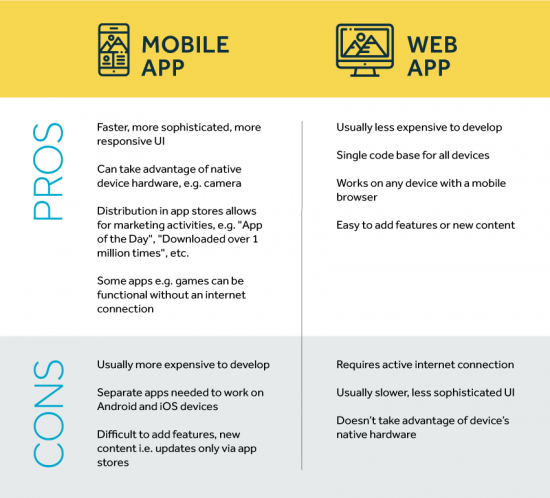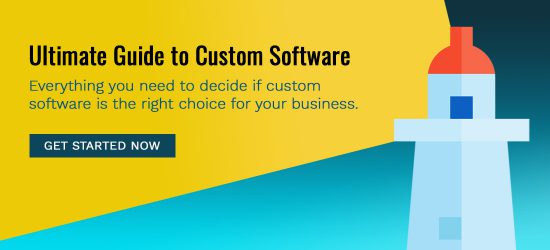The digital economy has dramatically changed the business landscape, and in no place is this more evident than the Fortune 500. Today, 43 of the 100 companies on that list weren’t there ten years ago.
Why did some survive while others perished? Companies that adapt to new market conditions or create new opportunities to disrupt their industry survive, while those content with the status quo find themselves rapidly losing market share (and often wonder what happened).
Think about what Uber has done to the taxi business, how Airbnb changed the way we book a room, or the way Amazon disrupted our shopping habits. What do they all have in common? These companies developed web and mobile app-based platforms to fundamentally change the way they build and deliver services.
 Welcome to the Platform Economy
Welcome to the Platform Economy
A Platform is loosely described as a technology framework or infrastructure that facilitates digital matchmaking. In our Amazon example, it’s a platform that connects buyers and sellers.
You can’t deny the positive impact the development of new web and mobile apps has had on business. YouTube, another example of a successful platform to connect makers, viewers and advertisers, is expected to generate $4.96 billion this year.
Why are platforms taking off? The web or mobile apps at the heart of these platforms address a niche to make something easier like helping customers find a room, get a lift, or have a shopping list item delivered quickly to their door with just the click of a button.
For businesses looking to remain relevant, consider whether there’s a place to add value by bringing people together in an easy-to-use platform. If you think there is, read on: The Platform Economy beckons.
App Development Delivers Platform Promises
Disrupting traditional approaches to business is at the core of the Platform Economy, but what drives these platforms is nothing new. Re-imagined ways of using mobile or web apps to disrupt an existing marketplace is at the heart of the transformation.
Woodbine Entertainment transformed horse racing when they launched HPIBet (formerly Horseplayer Interactive launched in 2002) and gave racing enthusiasts a whole new way to participate in the action. In the B2B space, appliance manufacturer, Miele, created a platform to not only help customers select the right appliances but gave chartered agents a turnkey ecommerce solution that delivered a seamless customer experience.
What Woodbine, Miele, and other traditional companies who have embraced the digital world are doing differently, is they aren’t waiting for digital transformation to create a crisis that forces a change in their approach to business. They embrace the possibilities to be transformative and lead the way.
 How to Get Started
How to Get Started
Like any major custom software project, planning is the key to getting your web or mobile app development idea off the ground. Take the time to dig into the details including:
- Who are you targeting – What’s the size of that market, what’s the state of readiness of this market to a adopt a new platform, and how will you engage with them?
- What’s the pricing model – There are different options from pay-as-you-go to subscription and depending on the platform you plan to build, one pricing option might fit better than another. Understanding pricing is critical because an idea will fail if it can’t sustain itself financially.
- Are there technologies you must integrate – Take a look at what areas of your business need to connect or talk to the new platform. The need to integrate all the solutions together seamlessly could drive some of the technical decisions you make.
- Plan to scale – Evaluate whether your platform will have peak periods or steady growth. It’s important to be realistic about usage models so you can ensure your system is fast and responsive when customers want it (or they’ll stop coming back).
- Consider the tech –First, consider if you want to host the application in the cloud, on-premises or through a hybrid model. Second, your business requirements and development partner will determine the right technology stack to power your application. Your web server, app server and database can be developed using tech stacks such as LAMP, .NET or WordPress. Consult with experts who have experience with software development and digital platforms to understand your options.
- Making sense of dollars and cents – Whether you’re looking to build a platform that has all the bells and whistles right out of the gate or prefer a conservative approach that starts small and adds features as popularity grows, there are additional considerations. Make sure your budget includes software development, design (User Experience and UI), branding, infrastructure requirements, maintenance, support and project management.
- Focus on continuous improvement – I’d love to say you can launch a great product and forget it, but today’s customers require constant feature and experience enhancements to maintain an edge. IXACT Contact is a great example of a platform that not only focused on adding new features but also recognized when the user interface needed an upgrade to keep up.
Mobile App Development Decisions
Before starting on app development, you need to understand your customers and how they interact with you so you can make the best decision on the type of platform you need. This could mean choosing to build a mobile app, and/or a web app, or a custom solution that leverages the best of both options.

When it comes time to start working on your mobile or web app, spend time with experts to evaluate the options and get help to make the best choice for your business and your customers.
